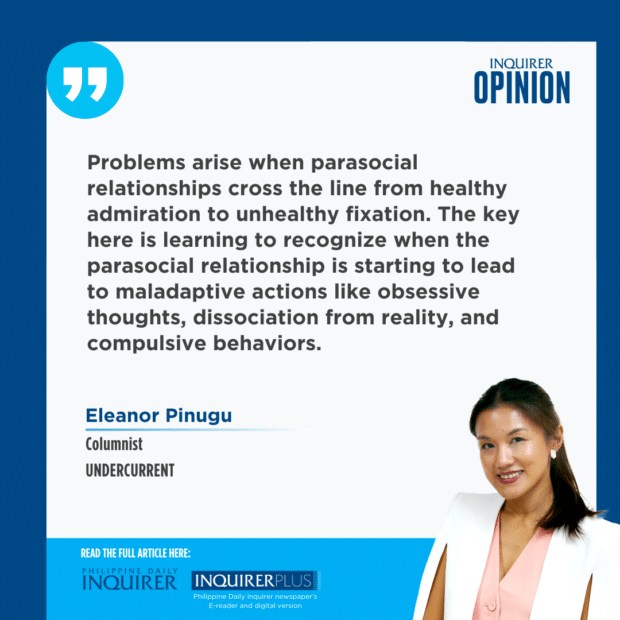
Fame certainly comes with a price. About three weeks ago, I was having dinner with an actor/entrepreneur friend to discuss some of the challenges he was going through with his business. When he was approached by a fan asking to take a picture, he kindly refused and explained he was in the middle of a serious meeting. Instead of leaving, the fan went on Facebook Live to show her followers that she was standing a few inches away from her idol. Albeit very frustrated, he quickly said hello and then kindly asked the woman to stop so we could resume our conversation.
The idea of parasocial relationships, defined as one-sided connections that people have with media personalities, has been around since the 1950s. However, the advent of social media has significantly altered the landscape. Today, our 24/7 online behavior has greatly expanded the original concept. Social media has given us even more intimate access to the personal lives of famous actors and singers, as well as athletes, business founders, influencers, advocates—basically anyone with a public profile—making it easy to form these parasocial connections.
A good example is the public’s sudden fascination with Carlo Yulo’s personal life after he won two gold medals in the Olympics. Just a few months ago, many people barely knew his name. However, watching his triumph online and then discovering videos of Yulo as a young gymnast made some people feel they were always part of his journey. Following his victory, many became deeply invested in his story—now passionately weighing in on who he should date or how he should handle his challenging relationship with his mother.
Public personalities have strategically used social media to drive engagement and strengthen fan-celebrity connections. As a 2021 study on human behavior pointed out, live streaming has changed parasocial relationships from being purely one-sided to something more interactive, allowing some real communication to take place. This new “one and a half” parasocial relationship fosters even deeper emotional involvement and stronger fandom cultures. Parasocial relationships are not just about emotional connections; they also make good business. This is why the Singapore prime minister made a deal to be the exclusive Southeast Asia stop for Taylor Swift’s “Eras Tour.” The strong attachment that fans feel can lead them to fly to another country to watch a concert or to line up for hours to buy celebrity-endorsed merchandise.
Research suggests that parasocial relationships can positively affect one’s well-being and self-esteem, especially for adolescents looking for a safe space to explore their identities. When young people admire celebrities with traits and achievements they aspire to, it can inspire them to work on their betterment. Parasocial relationships can also provide comfort by fostering a sense of belonging. As adolescents support their favorite media personalities, they often engage with fandoms and online communities, helping them meet like-minded individuals.
However, problems arise when parasocial relationships cross the line from healthy admiration to unhealthy fixation. Psychologist Lynn McCutcheon codeveloped the Celebrity Attitude Scale, which identifies three levels of celebrity worship: 1. Entertainment-social, where most fans enjoy a celebrity’s work;2. Intense-personal, where some fans internalize the celebrity’s values and see them as a soulmate; and 3. Borderline-pathological, where someone is willing to engage in extreme or illegal behavior for their favorite celebrity. For instance, some fandoms use their collective influence to harass anyone who comments negatively about their idol. Recently, the Philippine pop group BINI appealed to fans to respect their privacy after some people knocked on their hotel room in the wee hours of the morning to ask for a picture.
The key here is learning to recognize when the parasocial relationship is starting to lead to maladaptive actions like obsessive thoughts, dissociation from reality, and compulsive behaviors. Suppose you find that a parasocial bond is consuming too much of your time, energy, and resources. In that case, it is necessary to take a step back and reconsider what your emotional attachment to a public personality is costing you and others. Experts also suggest reflecting on the true nature of these relationships—remembering that they are often being cultivated with commercial interests in mind and lack the mutual give-and-take of true friendships. As comforting and inspiring as parasocial relationships may feel, they cannot replace the richness of genuine friendships built through face-to-face interactions and shared experiences. By intentionally creating some emotional distance between yourself and the person you admire, you open up space for real-life connections to flourish. You might find that your parasocial relationships are not the core of your social life but a healthy supplement to more reciprocal, fulfilling relationships.
eleanor@shetalksasia.com